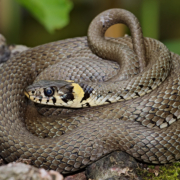May in the Forest
This is the best month for dawn chorus walks, when you can hear a symphony of song from many different kinds of birds in woods, parks and gardens. On the May Day holiday (6th May this year) the sun will rise at 5.26 am – wait until the end of the month and it will be nearly half an hour earlier.
It is generally the male who sings, driven by the imperatives of the breeding season: to announce their territory, deter rival males, attract and keep a mate. The songs can be very complex and evidence suggests that birds will sing a basic song peculiar to their own species but listen to, and learn from, others of their kind and practice to produce a more sophisticated version with various embellishments. This can result in a ‘local dialect’ of song. I’m doing well if I can identify a handful of bird songs. One of my favourites, which I’d noticed and listened to long before I knew the singer, is that of the Wren. This tiny bird packs a punch with its loud song of repeated notes and rapid trills: an amazing sound to come from a miniscule body.
House Martins are newly arrived and will set to making their nests of mud under the eaves of houses and barns. Should the weather have turned dry, you can help them greatly by putting out trays of mud in a location safe from predators.
For many birds the breeding season is already well-advanced. You may come across a baby bird looking helpless and wonder how you can help, and indeed whether you should try. The advice of those who know, e.g. Songbird Survival, is that nestlings (with no or few feathers) can be returned to the nest but fledgelings (which have feathers and are ready to leave the nest) are best left alone as a parent bird is probably feeding them. Also:
- Keep any intervention to a minimum
- Keep surrounding areas free of potential predators, particularly cats – keep your cat indoors where possible during this vulnerable season for baby birds
- If you do need to handle a bird, wear gloves and maintain minimum contact to minimise stress for the bird
- Don’t try to feed and look after baby birds yourself – this needs specialist experience of a wildlife rehabilitator. Our nearest is Cuan Wildlife Rescue at Much Wenlock.
Linda Iles





